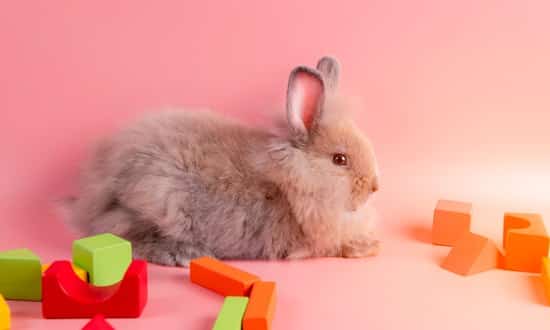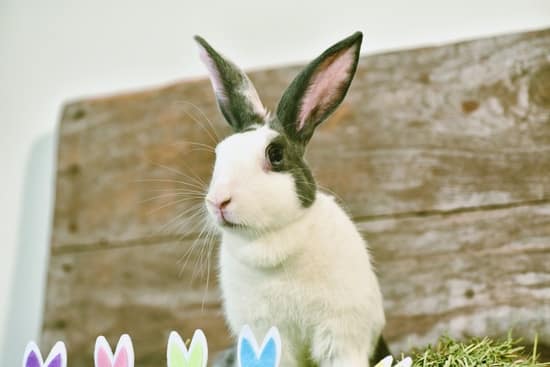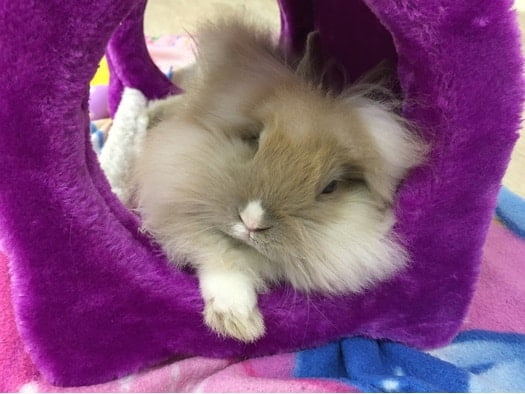Part of the joy of a pet rabbit is having a constant playmate. It’s a fun and enjoyable way to bond together. But a rabbit that no longer wants to run around and play games is out of character.
Your rabbit may not want to play because its toys lack appeal. Rabbits are fussy and grow bored quickly. Their toy supply must be changed regularly. You should also check for signs of ill health or injury. If a rabbit is in pain, they’ll withdraw from everything they once enjoyed.
It’s only natural that rabbits become more inactive as they grow older. As energy levels drop, rabbits start to enjoy less energetic activities. Changes in your rabbit’s behavior, and sudden lethargy or sluggishness, should always be investigated by a vet for signs of health issues.
Why is My Rabbit Not Playing Anymore?
Rabbits start to calm down as they age. Bunnyhugga outlines the life cycle of the average domesticated rabbit. As you’ll see, they become less active as time moves on.
This should never be an overnight occurrence, though. Rabbits are inquisitive and intelligent, and they adore interaction. If your rabbit suddenly shows no interest in engaging, something is wrong.
Your rabbit’s reluctance to play could be mental or physical. If your rabbit doesn’t run around but is otherwise healthy, it’s likely a physical illness. If they avoid all contact, they’re probably experiencing emotional turmoil. Common reasons for a rabbit not wanting to play include:
- Boredom. The rabbit is bored with all the toys in their hutch. They crave new stimulation.
- Intimidation. If two rabbits share a hutch, one dominant rabbit may have claimed the toys. This may leave the other reluctant to engage with them.
- Stress or Anxiety. The rabbit is feeling uncomfortable. Rabbits do not cope well with stress, and retreat into themselves.
- Physical Weakness. As rabbits grow older, their muscles deteriorate. Your rabbit may have arthritis in the back legs, or another debilitating condition.
- Other Sickness. If your rabbit has a medical concern, it affects every aspect of their life. They’ll withdraw from any interaction.
A rabbit showing reluctance to play doesn’t necessarily mean that they’re beyond help. Once you get to the root of the issue, they’ll be back to their old self.
Alternatively, they may be content to amuse themselves in other ways. Even if a rabbit does outgrow play, they can still be happy. You’ll need to adjust your approach to their care.
How Do Rabbits Like to Play?
Rabbits are playful, but they’re also particular. If you want your rabbit to enjoy games, you’ll need to play the right way.
- Rabbits like to call the shots. Don’t force your rabbit into a playtime against their will. Wait for them to approach you and instigate a playtime.
- Rabbits love attention and interaction. Rabbits are social and like attention. Wherever possible, get involved in the play yourself. It will improve your rabbit’s experience no end.
- Rabbits like to keep all four feet on the ground. Rabbits sometimes climb for their own amusement. They dislike being taken off their feet, though. Keep all games at the ground level.
- Rabbits are destroyers, not creators. Rabbits take pleasure from tearing things apart with their paws and teeth. A humble phone book, for example, can provide hours of joy.
- Rabbits enjoy some noise. Rabbits can be shocked and frightened by loud, sudden sounds. They do enjoy noisy toys, especially ones they can toss around.
- Rabbits need to embrace their instincts. Even the fluffiest, most domesticated of house rabbits retain wild instincts. Let your rabbit dig and hide when they’re playing.
- Rabbits do not enjoy rough play. Rabbits are fragile, so don’t try to roughhouse or wrestle with your rabbit. They’ll become frightened and try to escape.
- Rabbits need exercise. Never overlook just how energetic a young rabbit can be. This liveliness will start to taper off as they age.
- Rabbits need intellectual stimulation. Rabbits are not as smart as humans, but they’re not stupid. They welcome the chance to flex their intellectual muscles.
If you abide by these rules, your rabbit will look forward to playtime. Ignore them, and they’ll consider the experience something to endure rather than enjoy.

Fun Things to Do with Your Rabbit
You now know how your pet likes to play. You can put into action with games and activities they’ll enjoy. Examples could include:
- Play fetch. Roll a small ball to your rabbit. They’ll likely nudge it back to you. If you have a larger ball, your rabbit may even try to sit on it.
- Hide treats in your rabbit’s hutch. Rabbits enjoy seeking rewards. They’ll happily dig and search for food. Bury fresh fruit and veg in their hay. Just remember to remove uneaten food before it goes moldy. Unfortunately, mold can kill pet rabbits.
- Create an obstacle course. If your rabbit runs free, place some obstacles in their way. They’ll enjoy working out how to get past them. You don’t need to buy expensive toys. Safe household items work perfectly well.
- Read to your rabbit. Rabbits enjoy soft, rhythmic human voices. If you’re reading a book or newspaper, do so aloud. Your rabbit will be transfixed, and will not notice that you’re not directly addressing them.
- Jangle small, noisy toys. If your rabbit hears a noise, they’ll want to investigate. If the toy is small enough to hurl around, they’ll interact with it.
- Create tunnels. Tunnels replicate the experience of a wild warren. Purchase or create a tunnel, ideally one that makes a rustling sound. Your rabbit will love running through it.
- Let your rabbit chase you. Some rabbits enjoy being chased, though many find it frightening. Most rabbits enjoy chasing, though. Take a few steps back, and call your pet
- Lay on the ground. Just lay down flat, and allow your rabbit to use you as a climbing frame. You’d be surprised at how long this can amuse them.
There is a litany of games that you can play with your pet to keep them entertained. Just remember to abide by the rules. Don’t be rough, don’t be too loud, and don’t handle the rabbit unexpectedly.
How Do I Know if My Rabbit Wants to Play?
Rabbits know their own mind, and they’ll tell you when they’re feeling playful. The Language of Lagomorphs explains some of the most common signs. These include:
- Running around your feet. This means that your rabbit is delighted to see you, and is filled with playful energy. Let them run complete three circuits before responding. The rabbit will also likely start to binky.
- Tugging at your sleeve or trouser leg. This is the same behavior as a child seeking your attention. The rabbit is saying, “come and play with me.”
- Nipping. You may think that this is your rabbit misbehaving. In truth, they’re usually just over-excited and want your attention. Dissuade the behavior, but don’t punish them.
- Tossing toys around. If your rabbit is playing with their toys, they’re happy. They’ll enjoy an interactive playtime even more, though. This is a great chance to bond with your rabbit.
- Pushing household items around. This is similar to a cat knocking a glass off a table. Rabbits are not as strong as felines, but have similar mentalities. If there are no toys around, they’ll find the next best thing to keep them occupied.
You’ll typically find that rabbits are most playful early in the morning, and during the early evening. This is when they have woken up from a long sleep and feel great.
Don’t force your rabbit to play if they don’t approach you. They will not understand, and may think that you mean them harm. If your rabbit is suddenly not interested in play, investigate why.
How Do I Know When My Rabbit Has Finished Playing?
Rabbits know their own mind. They won’t be shy about telling you when enough is enough. Typical rabbit behaviors that denote they’re finished with a play session are as follows:
- Flopping suddenly on their side. Your rabbit is exhausted, and happy. They’re all played out. If the rabbit flops on their back, they’re frightened.
- Grunting. Your rabbit is starting to get grumpy, and wants to be left alone.
- Running toward their hutch. This is hardly a subtle sign. The rabbit is saying, “I’d like to go home and take a nap.”
You can end playtime whenever you’d like. You may have a grumpy and defiant rabbit on your hands if they’re not ready, though. Expect to be unpopular for a while if you abandon a session unexpectedly.

My Rabbit is Not Playing with Toys
Toys are important. They provide stimulation when you’re unable to entertain your rabbit. They keep rabbit teeth and claws healthy, providing the opportunity to tear and gnaw. They make your pet’s life more enjoyable.
If you don’t fill your rabbit’s hutch with toys, you are making a rod for your own back. Rabbits wake up at the crack of dawn, full of energy. If they have no way of amusing themselves, they’ll likely become noisy and boisterous.
You may find that your rabbit loses all interest in their toys, though. Possible explanations for this include:
- Your rabbit has had the same toys for a while. Rabbits are hardwired to seek new experiences. They lose interest in the same old entertainment.
- The toys are boring. They don’t make a noise, or appeal to your rabbit’s preferences.
- Your rabbit shares a hutch, and the other rabbit is bullying them. In a skewed power dynamic, one rabbit may urinate on the toys to claim them.
- Your rabbit has lost interest in playing by themselves. They crave company. This could be another rabbit, or human interaction.
- Your rabbit hurt themselves playing with a toy, and is now afraid of them.
- Your rabbit is stressed or anxious. This will have a significant effect on a rabbit’s quality of life. A playful spirit will be the first casualty.
It’s also possible that your rabbit has just outgrown toys. This is rare, though. Most rabbits retain the same interests, even into their dotage. They may not be as physically active as they once were, but toys still hold appeal.
Learn why a rabbit has suddenly lost interest in toys. It may be a precursor to a more severe health problem. The most common explanations remain boredom and stress, though.
How to Recognize Bored Rabbit Behavior
If your rabbit is bored, it’s never a good thing. They’ll look to fill their time through unsuitable and unsafe activities. These could include:
- Destructive Behavior. The rabbit will claw, scratch, and gnaw at their hutch. This could be the wire, or the wood. Either way, they risk hurting themselves. A house rabbit will destroy furniture.
- Excessive Eating. When a rabbit has nothing better to do, they eat. This will lead to weight gain, and potential health concerns. Thankfully, it’s impossible for a rabbit to over-eat hay.
- Excessive Grooming. This is the most severe symptom. Your rabbit will start to tear their own fur out in clumps. The rabbit may also form hairballs in their gut.
Just providing toys isn’t enough. Your rabbit needs to enjoy playing with these particular toys. What’s more, they need to be changed regularly. As soon as a toy loses its luster, your rabbit will be indifferent to it.
There’s no need to buy toys from a pet store every few days. Cardboard tubes and boxes are a cheap and easy rabbit toy. If a rabbit has something to chew and destroy, they’re content. Just make sure that it’s not something that rabbits shouldn’t chew.
Of course, you’ll still need to interact with your pet. You should also consider getting a second rabbit, if your rabbit lives alone. Rabbits are social by nature, and don’t do well on their own.
How to Recognize Stressed and Anxious Rabbit Behavior
If your rabbit is stressed, they’ll behave in a similar way to when they’re bored. They’re more likely to turn their destructive tendencies inward, though. You’ll see more self-mutilation that destruction of property.
Also, a rabbit that lives in anxiety will lose their sense of fun. A lack of interest will be just one symptom. They’ll be reluctant to engage with anybody or anything. They’ll often freeze on the spot too, and stare with bulging eyes.
A stressed rabbit may become aggressive. They’ll growl, and even lunge, when you approach their hutch. Handling will become impossible. The rabbit will bite and claw to avoid being touched.
Do whatever you can to keep your pet calm. Speak to them in a soothing voice and, if you identify a stress trigger, remove it immediately.
If you cannot tell what is stressing the rabbit out, consider veterinary help. The rabbit may be unwell. Rabbits do not always demonstrate symptoms of sickness. The stress that feeling under the weather will provoke is unavoidable, though.
My Rabbit is Not Running Around
Older rabbits naturally start to slow down, and show less physical prowess than their younger counterparts. Some rabbits slow down as soon as three years of age. Such rabbits should still show some desire to exercise, though.
If your rabbit suddenly stops running, check them for injury. They may have pulled a muscle, or fractured a bone. If you cant spot anything yourself, it doesn’t mean it hadn’t happened. X-rays and scans may be required.
Middle-aged rabbits are also prone to arthritis. Symptoms include:
- Difficulty moving. This mainly involves hopping within, and outside, the hutch.
- Refusing to climb, or engage in any more vigorous physical activity.
- Lack of grooming, as this is too painful. This leads to dull fur and a messy bottom, as the rabbits cannot clean themselves up.
- Urine scalding on the back legs. This will be because the rabbit can move their leg while urinating.
Arthritis is painful, and affects a rabbit’s quality of life. Thankfully, while there is no cure, it can be managed. Investigate the many and varied supplements available from pet stores. You should also massage your pet’s legs regularly.
Some rabbits are born sedentary, and lack the motivation to run by their very nature. If they’re happy this way, leave them to it. Just watch their weight, and entertain them in other ways.
My Rabbit Won’t Leave Their Cage Anymore
If your rabbit does not leave its cage, they are feeling unsafe. You need to convince them they have nothing to afraid of.
Start by leaving a cardboard box next to the open door. This way, the rabbit can move from one secure location to another. This should alleviate some of their concerns. Eventually, they’ll regain their confidence. If this doesn’t help, the problem is more likely to be medical.
Rabbits should remain spirited, at least to an extent, throughout their life. When they lose all interest in play, there is invariably an explanation. Rabbits do not just decide that they’re too old to play. If the rabbit is otherwise happy, there’s no need for urgent action.

